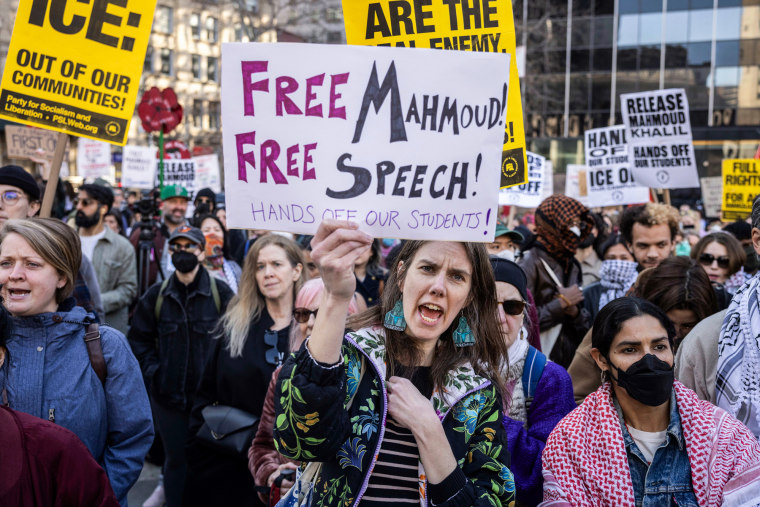Secretary of State Marco Rubio said the presence of Columbia student protester Mahmoud Khalil in the U.S. would have “potentially serious adverse foreign policy consequences,” according to a memo obtained by NBC News.
Khalil, a graduate student who helped lead student protests against the war in Gaza at the university last year, was arrested by immigration authorities on March 8 outside of his university-owned apartment in New York City. He was taken to a detention center in Louisiana, where he remains.
On Tuesday, an immigration judge in Louisiana ordered the federal government to provide evidence by Wednesday justifying its attempt to deport Khalil.
Rubio responded on behalf of the government in a roughly one and a half page letter sent to the court on Wednesday.
He cited an obscure provision in the Immigration and Nationality Act of 1952 to justify Khalil’s removal from the U.S. The provision allows the secretary of state to deport noncitizens if the secretary determines their presence in the United States “would have serious adverse foreign policy consequences.”
Rubio accused Khalil of participating in “antisemitic protests and disruptive activities, which fosters a hostile environment for Jewish students in the United States.”
“The foreign policy of the United States champions core American interests and American citizens and condoning anti-Semitic conduct and disruptive protests in the United States would severely undermine that significant foreign policy objective,” he wrote.

In response, Khalil’s lawyer, Baher Azmy, said at a virtually held press briefing on Thursday that “immigration authorities have finally admitted that they have no case whatsoever against him.”
“What this case is really about is whether lawful permanent residents — and other immigrants to this country — can speak out about Israel’s brutal attacks on Gaza and Palestine, or any other important matters of discussion in the national discourse, without fear of deportation for expressing beliefs that the First Amendment completely protects,” he said. “Are US citizens going to be next?”
Assistant Chief Immigration Judge Jamee Comans will decide whether Khalil can be removed from the United States or ordered to be release at a hearing scheduled for Friday in Louisiana. If she rules that he can be deported, Khalil’s legal team can appeal.
In less than five weeks since Khalil’s arrest, immigration authorities have arrested dozens of foreign students — many of whom are Muslim — at universities across the country or revoked their visas.
Secretary of State Marco Rubio said at a news conference last month that the State Department revoked more than 300 student visas.
“We do it every day. Every time I find one of these lunatics, I take away their visas,” Rubio said.
On Wednesday, the Department of Homeland Security announced a task force to monitor the social media activity of immigrants, including foreign students, for antisemitism. Three sources familiar with the operation told NBC News that the task force will be screening an estimated 1.5 million foreign students studying in the United States for potential grounds to revoke their visas.
The unprecedented actions by the immigration system come amid the federal government’s broader crackdown on universities in the name of combatting antisemitism.
In February, the Department of Justice launched a task force to “root out” what it calls “anti-Semitic harassment in schools and on college campuses.“
The administration has also halted hundreds of millions of dollars in federal funding to several universities in recent weeks, including Columbia, Harvard University, and Princeton University, citing dissatisfaction with how the universities handled last year’s protests against the war in Gaza.


